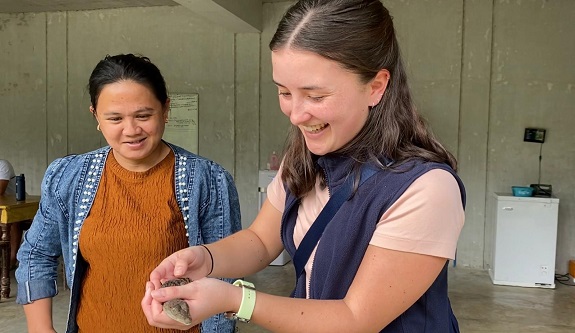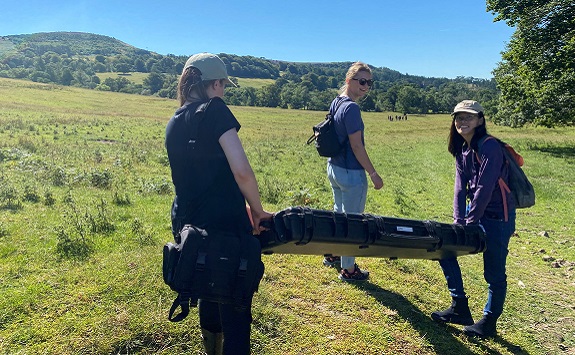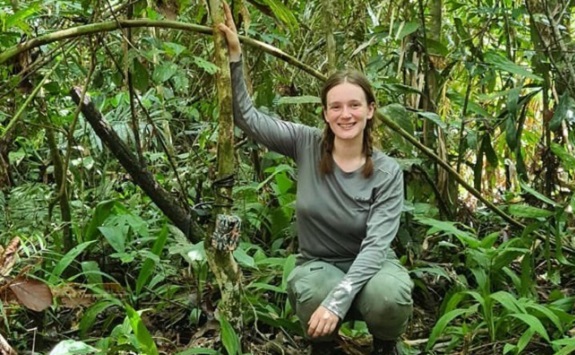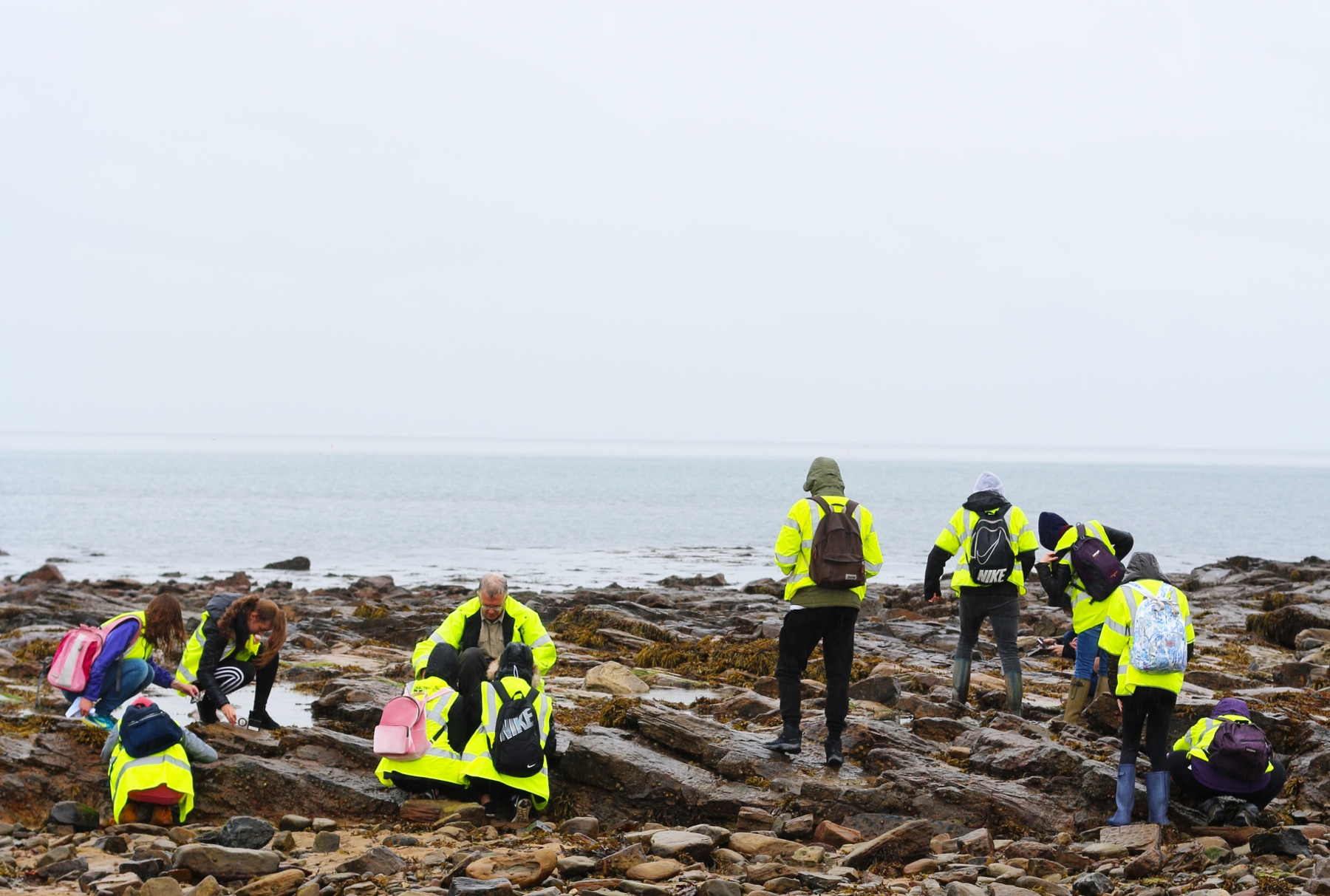MSc Global Conservation
Restoring biodiversity and ecosystems with effective conservation, built through ecological understanding, leadership and collaboration with decision-makers.
You will be introduced to contemporary global issues that staff, and collaborators, are working on and which require knowledge to understand, and analysis and critical thinking to address.
With an emphasis on current and emerging issues, you will be able to gather and synthesise relevant knowledge to address conservation problems, understand and interpret the policy landscape, develop ways of addressing these issues and communicate research to inform policy.
This new MSc programme offers you a unique experience in global biodiversity conservation, with a focus on the global issues highlighted by the Convention on Biological Diversity’s Global Biodiversity Framework providing you with insights into this rapidly developing area, and the skills and experience to begin your career journey.

Teaching staff
The staff teaching on this programme are closely involved with the Global Biodiversity Framework, working with a range of governments, and national and international organisations to carry out relevant research and support delivery of these global goals and targets.
Find out more about each of the module leaders below.
Prof Philip McGowan
I joined Newcastle University in 2013 after 20 years working in international conservation undertaking fieldwork on threatened species in Asia, Africa and South America, and working on capacity building programmes in Asia. I have worked as a research academic, consultant and for a small international conservation organisation. I now focus on research to inform the implementation of policies and actions that will deliver species conservation especially through the Kunming-Montréal Global Biodiversity Framework. Research gaps and questions are identified through participation in Convention on Biological Diversity meetings engagement with IUCN, where I chair the Global Biodiversity Framework Task Force of the Species Survival Commission.
What are you most pleased to have achieved or proud of?
Two things. Research on species that informed the Kunming-Montreal Global Biodiversity Framework and the report on a monitoring mission to a World Heritage Site in northern India.
What do you enjoy most about your research?
People. There are some amazing people involved in conservation: academics, policy officials, NGO staff. It is fantastic to work with people with such knowledge, ability and energy.
What do you think is the biggest challenge in achieving global biodiversity goals by 2030?
We know what needs to be done, the big challenges are reducing threats and scaling up the actions that we know can avoid extinctions
What will I learn during your modules?
Writing for Policy
There is a significant demand for evidence to inform biodiversity policy at many levels, from global to local, and given the extensive amount of research available in the scientific literature, this can be a real challenge to do well. Students will be introduced to a range of policy processes that seek to enhance the transfer of policy-relevant science into the policy arena. These include global assessments of scientific knowledge on broad issues, such as the IPBES assessments and their Summaries for Policy Makers, and national level syntheses on particular topics, such as the UK governments series of POST notes. Students will then enhance their understanding of writing for policy by developing their own policy relevant document for policy makers on real world issue of significant importance to shaping biodiversity policy in a particular context (e.g. particular country).
During the Drivers of Biodiversity Loss module students will gain an understanding of the five main drivers of biodiversity loss that have been defined by the Intergovernmental Platform on Biodiversity and Ecosystem Services (IPBES), the underlying evidence base on thee drivers and what is needed to address them. Students will explore the coherence between the issues identified in the IBPES assessment and the responses adopted in the Kunming-Montréal Global Biodiversity Framework. As the final module in the course, students will be encouraged to draw on knowledge and skills gained in the other five modules in understanding how to tackle these main drivers of biodiversity loss.
Dr Louise Mair
My research background is in macro-ecology. I studied the impacts of climate and land use change on species distributions during my PhD at the University of York and first post-doctoral position in Sweden. When I joined Newcastle University in 2017, my research focus shifted to delivering the science needed to inform and implement global species conservation policy. I am now a Research Fellow, and I work with a large international network, including colleagues at the International Union for the Conservation of Nature (IUCN), and I engage with global policy makers through the Convention on Biological Diversity.
What are you most pleased to have achieved or proud of?
I am most proud of the Masters students I have supervised who produced such excellent research that they achieved scientific publication.
What do you enjoy most about your research?
I love working with and learning from colleagues from around the world. Their expertise and enthusiasm for conservation keeps me motivated.
What do you think is the biggest challenge in achieving global biodiversity goals by 2030?
We need the whole of society, including businesses, which need to value biodiversity and change their practices. That’s a huge challenge to the status quo.
What will I learn during your module?
The Assessing the Status of Biodiversity module will introduce students to a diversity of biodiversity status assessments that are used in global conservation policy, including assessments of species extinction risk, genetic diversity and the risk of ecosystem collapse. Students will develop a working understanding of these assessments through lectures, workshops and an online course that provides a certificate of achievement upon completion. Students will develop practical skills in spatial data handling and analysis, which are essential for carrying out biodiversity assessments, and will develop critical thinking skills through participatory seminars, helping them to challenge accepted ways of thinking and consider social context within biodiversity conservation.
Prof Marion Pfeifer
I am a land systems and conservation scientist with extensive academic and research experience. I currently serve as Co-Director of the IAPETUS DTP and NU’s Centre for Climate and Environmental Resilience, while also leading agroforestry initiatives and directing the MRes Ecology programme at Newcastle University. Previously, I held academic positions at Imperial College London, the University of York, and the University of Potsdam. My research, focused on landscape ecology, biodiversity, remote sensing, and decolonized conservation approaches, has earned global recognition. I hold a PhD from the University of Jena, Germany, and have received multiple prestigious fellowships.
What are you most pleased to have achieved or proud of?
Building strong research and conservation partnerships, particularly in Tanzania and the Philippines. This collaboration has driven advancements in fundamental biodiversity science, particularly in understanding species responses to habitat fragmentation, while also promoting equity in management and conservation practices.
What do you enjoy most about your research?
As academics, we have the freedom to explore challenges in both research and the translation of evidence into management and policy. For me, the opportunity to travel and conduct fieldwork and to see actual impact of this research on the ground has been one of the most rewarding aspects of my research over the past decades.
What do you think is the biggest challenge in achieving global biodiversity goals by 2030?
A key challenge is ensuring that activities and policies aimed at advancing global biodiversity goals are implemented with equity at their core. This means integrating equity at every stage—from setting objectives and designing methods to assessing impact and monitoring effectiveness.
What will I learn during your module?
In the Sustainability of Human and Natural Systems module, you will explore the sustainability of coupled human and natural systems (CHANS) and their responses to climate and land use changes. You’ll learn why human needs must be considered in conservation and policy decisions and how to promote long-term coexistence between people and wildlife while working toward the Sustainable Development Goals and Global Biodiversity Goals. Taught by academics with UK and international expertise, the course introduces CHANS as a foundation for modern conservation science. Through lectures, interactive seminars and workshops, you'll examine real-world case studies and conservation tools to critically reflect on the effectiveness of these tools.
Assessments include a group based debate on a 'hot topic in conservation science' (30%) and a policy brief as individual report on a subject of your choice (70%).
Prof Aileen Mill
I am a quantitative ecologist focused on the interplay between scientific research and evidence-based decision making. I have got here through being inquisitive about how systems work and using modelling approaches to describe, assess and predict changes. I started out as a marine biologist, studying food webs and trophic interactions. I spent a period as a government scientist working in fisheries stock assessment, then zoonotic diseases which gave me insight into policy and decision making as well as learning new modelling approaches. I have been an academic at Newcastle University since 2013 where I continue to work on topics of national and global policy importance including species management and infectious disease.
What are you most pleased to have achieved or proud of?
I am most proud of developing prioritisation frameworks for invasive species management used globally to inform national policies.
What do you enjoy most about your research?
I enjoy the problem solving aspects of my work, this involves working with others to deconstruct an issue to find a solution.
What do you think is the biggest challenge in achieving global biodiversity goals by 2030?
There is a great challenge getting people from all sectors to pull in the same direction, getting the whole of government and whole of society to work together.
What will I learn during your module?
The Biodiversity Policy module considers the interaction between science and global and national policy for biodiversity. Students will be familiarised with policy cycles and processes and will investigate current global biodiversity conservation examples to illustrate some of the challenges involved in setting and implementing policy. The taught sessions will draw heavily from real experiences in operating at this science-policy interface, including perspectives from policy representatives and will allow students to be immersed in debates and negotiations using recent case studies.
Dr Fabrice Stephenson
I completed a PhD in marine ecology at Newcastle University (2013–2016), followed by postdoctoral research on fisheries and habitat modelling. I then worked as a marine ecologist at NIWA and later as Principal Scientist at Fisheries New Zealand, leading New Zealand’s delegation to SPRFMO. In 2022, I became a Senior Researcher at the University of Waikato, and in 2023, returned to Newcastle as an NUAcT Fellow. My research focuses on marine spatial planning, climate impacts, and conservation policy, collaborating with IUCN and regional fisheries organisations to inform management and policy.
What are you most pleased to have achieved or proud of?
Leading IUCN WCPA's Marine Theme to advance global marine protection targets and guiding fisheries-conservation policy.
What do you enjoy most about your research?
Using spatial modelling to reveal how climate change and human impacts reshape marine ecosystems—and turning those insights into practical conservation tools.
What do you think is the biggest challenge in achieving global biodiversity goals by 2030?
Aligning rapid 30x30 protection with human needs—ensuring ecologically effective, equitable conservation that addresses climate, livelihoods, and governance gaps by 2030.
What will I learn during your module?
In the Designing and Evaluating Conservation Areas module, students will master protected area design, policy, and management, aligned with global targets like the Kunming-Montréal Framework. Through interactive sessions with practitioners, they’ll learn to evaluate effectiveness, address governance gaps, and integrate ecological and social needs. The module covers spatial planning tools, climate-resilient strategies, and stakeholder engagement—empowering students to advance equitable, science-based conservation for biodiversity and human well-being.
Through Phil’s connections with the International Union for Conservation of Nature, I was introduced to a network of conservation professionals, gaining valuable insights and giving me the confidence and motivation to explore my own career journey.
External contributors
Throughout this course you will collaborate with a wide range of partners who are actively engaged in biodiversity conservation across a range of sectors, working in industry, public agencies, non-governmental organisations and universities around the world.
A selection of these collaborators will deliver seminars that provide real world context to the material covered in modules and share their day-to-day experience of a career influencing the state of biodiversity. This may include corporate decisions that affect biodiversity, developing and undertaking research to fill key knowledge gaps, working to bring critical knowledge to inform policy and decision-making, or designing and implementing biodiversity policies.

What to expect from the course
Welcome to the profession
It is a very exciting, and demanding, time to begin a career in conservation. The challenges facing our natural world are considerable and, in a great many cases, increasing, and this will present you with many opportunities in the years ahead.
A career in conservation offers the opportunity to explore a range of different sides of conservation, spending your working hours thinking about, for and with species, habitats and/or genes. As you progress through your career, as you learn new skills, meet new people and gain invaluable experience.
Global Conservation MSc modules
We have created this MSc programme to provide students with a sound basis from which to pursue a career in conservation science, policy or practice. Our emphasis is promoting the use of science in policy and management decisions, and the six core modules are designed to equip you to take the next steps in your career. These modules also build towards your project, which is your chance to explore an important conservation issue in some detail. Find out more about each of the modules, below.
Sustainability of Human and Natural Systems
Biodiversity Policy: Global and National Processes
Assessing the Status of Biodiversity
Designing and Evaluating Conservation Areas
Alternative modules to those listed above, aligning with a student's particular area of interest, can be discussed with the Degree Programme Director.
The programme equipped me with a strong understanding of global conservation policies and practices, as well as with essential professional skills in project management, communications, teamwork, and operating at the science-policy interface.
Careers
With an in-depth knowledge of the role and development of global conservation policy, combined with strong written communication skills and critical analysis for informed decision making, you’ll be well placed for a range of careers, some of which are listed below.
Next steps along your career pathway could involve applying for a PhD or for jobs in a range of sectors. This course provides a strong academic and practical grounding that will allow work with organisations in the public and third sectors, including governments, NGOs and international conservation bodies.
Whatever path you decide to take, our Careers Service is here to support you and develop your application and interview technique.

There are a range of pathways to pursue a career that will benefit biodiversity conservation, including, but not restricted to:
- Developing, negotiating and implementing policy for governments, nationally and internationally
- Implementing projects on particular conservation issues for conservation organisations
- Carrying out research to increase knowledge, influence management decisions or inform policy
- Developing and managing conservation projects, nationally or internationally
- Working to reduce companies’ negative impacts on biodiversity and enhance the positive impacts
- Campaigning or advocacy for biodiversity
- Education and raising public awareness
- Working on nature reserves or other conservation sites
The course allowed me to explore how wildlife-related research can directly influence policy, which was instrumental in shaping my career path.
Projects
Your MSc project is a wonderful opportunity to explore in some depth a real-world issue that you are especially interested in. You can match your interest with our research experience and networks to identify, wherever possible, projects that excite you and are suitable for MSc level research.
You will be encouraged to start thinking about your project early in the academic year, and to identify the issue you will be exploring and how you will carry out your project.
The dissertation or project module is designed to provide students with the opportunity to apply the knowledge and skills you have acquired throughout the programme to a significant, independent research project focused on a well-defined conservation issue.

Projects being undertaken by MSc students in 2024-25
- Testing the umbrella species concept using the Species Threat Abatement and Restoration (STAR) metric with Chimpanzees in Kibale National Park, Southwestern Uganda.
- Identifying pollinator indicator species for chalk grassland restoration in the UK
- Identifying high risk seafloor areas to bottom trawling in Aotearoa New Zealand to support marine spatial management
- Drivers of Mobula ray distribution in the Hauraki Gulf
- Investigating the Impact of increasing the minimum landing size (MLS) on European Lobster stocks and fisheries in the Northumberland Coast
- Evaluating the Conservation and Recovery Potential of the Chinese Pangolin Manis pentadactyla using the IUCN Green Status of Species Framework
- Applying the IUCN Green Status of Species to assess recovery potential of the Crested Ibis Nipponia nippon in China.
MSc students published in scientific journals or on the IUCN Red List
Some of our MSc students have published their work in scientific journals or on the IUCN Red List, and some examples are:
Kuunal, S., Mair L., Pattison, Z., McGowan, P.J.K. (2020) Identifying opportunities for improving the coherence of global agreements for species conservation. Conservation Science and Practice. 2: e294. https://doi.org/10.1111/csp2.294.
Gant, J.R., Mair, L. and McGowan, P.J.K. (2021) Fragmented evidence for the contribution of ex situ management to species conservation indicates the need for better reporting. Oryx 55: 573–580. https://doi:10.1017/S0030605319000784.
Piipponen-Doyle, S., Bolam, F.C. & Mair, L. (2021) Disparity between ecological and political timeframes for species conservation targets. Biodiversity and Conservation 30: 1899–1912. https://doi.org/10.1007/s10531-021-02173-z
Davis S., Guerreiro Milheiras S., Olivier P.L., et al. (2024) Cropland can support high bird diversity in heterogeneous rural tropical landscapes. Bird Conservation International 34: e13. https://doi:10.1017/S0959270924000030.
McFarlane, J. J., Chacón, O. M., Arauco-Aliaga, R. P., Braunholtz, L., Sanderson, R., & Pfeifer, M. (2024). Selective impacts of subsistence hunting on mammal communities in Manu National Park, Peru. Biotropica 56: e13367. https://doi.org/10.1111/btp.13367.
Bawden, M., Seddon, M.B. & McGowan, P. (2025) Pseudunio auricularius (Green Status assessment). The IUCN Red List of Threatened Species 2025: e.T12798A1279820251.
My final dissertation project and meeting my supervisor proved to be very crucial moving forward after I graduated, carving out a significant impression in the beginning of my career.
